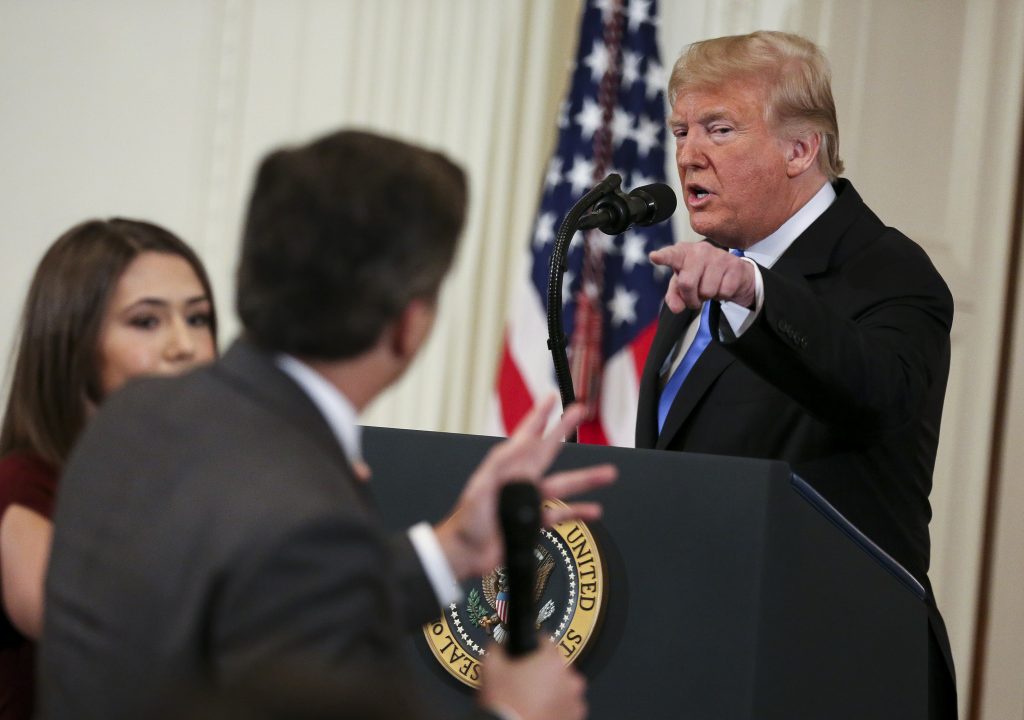
A few months ago, I wrote a piece in these pages suggesting that we regard Donald Trump as our first fascist president. It set off a certain stir. Since then it has become more common, not to say fashionable, to characterize our 45th president in this or similar terms, and to invoke Adolf Hitler and Benito Mussolini in describing him.
While suggesting significant differences, the historian Christopher Browning has recently described the present moment as “eerily similar” to the political climate of the 1930s. But taxonomy is not the important issue now. The bottom line is that Donald Trump is a menace, and that, no matter the outcome of the midterm elections, the critical task of the next two years is containing and ultimately removing him from office. This will be a very hard job, and it will take principled conservatives — there are still a few — as well as progressives to accomplish it.
The conservatives of whom I speak, intellectuals such as George Will, William Kristol, Andrew Sullivan and Max Boot, along with a couple of retiring Republican senators and a few political outliers like John Kasich and Ben Sasse, are not people with whom I ordinarily have much in common. But they do recognize such things as democratic process, the rule of law, and what I have described as common decency. They do not demonize the opposition party, nor do they divide the world into allies and enemies. They have a lot on their heads for helping to create, or at least rationalize what the modern Republican Party has become, and they have to varying degrees expressed their confusion and regret. They bring little to the table in terms of influence or numbers. But they do have value in dealing with Trump, because the fight against him must embrace a wide political spectrum.
The parallel with the 1930s is instructive here. The rise of Hitler engendered calls for a common front against him. At that moment, the available alliance was one among the former allies of World War I: Britain, France, Russia and the United States. The only political leader who saw the necessity of such an alliance was Joseph Stalin. Stalin, as the dictator of a communist state dedicated, at least in theory, to the overthrow of liberal, capitalist democracy, was an unwelcome friend. Britain and France were paralyzed by internal divisions and pacifist sentiment. The United States was profoundly isolationist, and determined not to meddle in what it saw as Europe’s quarrels. World War II resulted. We will never know whether it could have been avoided if the former allies had made common cause against Nazi Germany in time, but only one Western statesman, Winston Churchill, saw the peril at hand, and his voice was dismissed by all but a few.
We can’t afford the same mistake again, although our circumstances are different. The enemy this time is not a foreign power, but one within. Nor can we mistake the nature of the enemy. Ordinary democratic politics is a matter of give and take. Donald Trump is simply about taking. He takes, brazenly, the ordinary spoils of power, including the profit of his personal business empire. But he corrupts and undermines our basic institutions as well. He has taken over one of our two major political parties for his own, claimed virtually limitless authority for himself — for example, in the present birthright controversy, the power to rewrite the Constitution by executive fiat — attempted to use the military as a police force on American soil, and sought to destroy an independent judiciary. In all this, he is not the inception but the culmination of a lengthy process that has made our institutions vulnerable to just the would-be tyranny he represents. Browning, in his article on “The Suffocation of Democracy,” points to the partisanship of Mitch McConnell, the Senate majority leader, as the root of Trumpian evil. But the evolution of the Republican Party to its present condition goes back many decades, and McConnell, whatever his capacity for mischief, is a minor part of the story.
Nor is Trump an isolated phenomenon. Democracy is in retreat worldwide for many reasons, and Trump himself is more a symptom than a cause of this process even though he adds critically to it. As in the 1930s, a time of economic as ours is one of ecological crisis, many wonder whether it is not too cumbersome a system (or, put another way, too subservient to entrenched elites) to survive. It’s a good question, too. We have bet on democracy as a means of achieving at least a rough measure of social and economic justice. Yoked to contemporary capitalism, it has increasingly failed. But the desirable alternative, democratic socialism, must still be a government by popular consent if it is not to lapse into the tyranny represented by 20th century communism.
As Churchill memorably put it, democracy is the worst of all political systems except for all the others. So, it seems, we must do our best on behalf of the worst, and in the most unfavoring of circumstances. That means, first and foremost now, disabling Donald Trump. It won’t solve any of our other problems in and of itself. But when you start to shovel, you deal with the pile in front of you.
